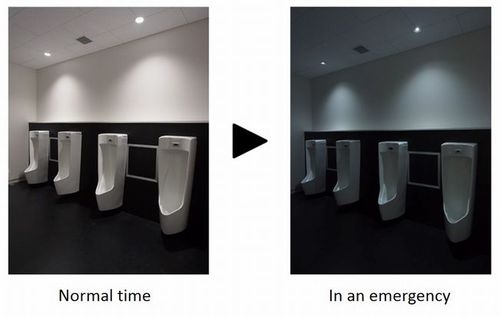August 17, 2015
LIXIL and Tohoku University Unveil Toilet Lighting System That Works Even in Blackouts
Keywords: Corporate Disaster Prevention / Reduction Environmental Technology Manufacturing industry

Copyright LIXIL All Rights Reserved.
Since July 2014, LIXIL, a Japanese living and housing solutions company, and Tohoku University, have been conducting research to develop the "Zero Energy Toilet (ZET)," which allows people to use toilets comfortably even in times of disaster. As part of the study, on June 2, 2015, they announced the development of a zero-energy lighting system that utilizes electricity generated from the power of water flushing down the toilet bowl to light the room.
In times of disaster, if the external power supply is disrupted, but water and sewerage systems are not extensively damaged, the new system can provide light to the washroom and make it usable at night, by converting the hydropower energy of the flushing water into electricity for lighting. The system is supplemented by power storage, high-efficiency LED lights, and power supply control circuits. In addition, the researchers developed a new type of LED lighting that takes advantage of the "Purkinje effect," a phenomenon that occurs at low light intensity, where blue objects reflect short-wavelength light and appear to be brighter than red objects that reflect long-wavelength light. The Purkinje effect gives the perception of higher brightness in dark places with minimal energy consumption.
In the ZET demonstration experiments site, set up in December 2014 on the campus of Tohoku University, the toilets equipped with the lighting system were monitored for the amount of power generation, storage of electricity, and power consumption for lighting in both men's and women's washrooms. The results showed that the electricity generation from flush water was enough to light up the rooms. Through further experiments, LIXIL and Tohoku University will work to establish control algorithms for comfortable and energy-efficient toilets, along with reliable operation.
Related
"JFS Newsletter"
- 'Good Companies in Japan' (Article No.4): 'Eightfold Satisfaction' Management for Everyone's Happiness
- 'Good Companies in Japan' (Article No.3): Seeking Ways to Develop Societal Contribution along with Core Businesses
- "Good Companies in Japan" (Article No. 2): Seeking "Happiness" for All Stakeholders
- "We Sell Services, Not Products": Using LCA to Measure the Environmental Benefits of Nihonkai Gas's Heater Rentals
- "Good Companies in Japan" (Article No. 1): Valuing Employee Happiness and Trust
Related
"Popular Articles"
- Japanese Organic Produce Supplier Wins 2014 Award of Excellence from Food Action Nippon
- DBJ Launches Green Building Certification for Residential Developments
- Kawasaki City and Toshiba to Jointly Demonstrate Renewables and Hydrogen-Based Off-Grid Energy Supply System
- LIXIL Establishes Women Empowerment Plan Called WeDo Action
- NEC Develops Software for Storage Batteries, Helping to Improve Next-generation Power Systems


